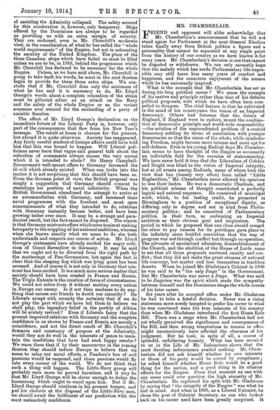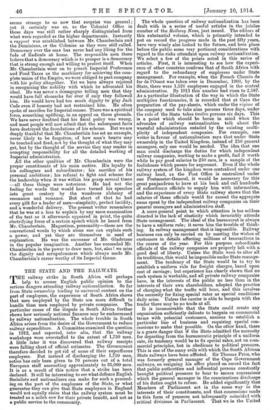MR. CHAMBERLAIN.
FRIEND and opponent will alike acknowledge that Mr. Chamberlain's announcement that he will not stand again fur Parliament at the next General Election takes finally away from British politics a figure and a personality that cannot be separated at any single point from the history of our country as we have known it for many years. Mr. Chamberlain's decision is one that cannot be disputed or withdrawn. We can only earnestly hope that the malady which has made Parliamentary life impos- sible may still leave him many years of comfort and happiness, and the conscious enjoyment of the esteem which he has universally inspired.
What is the example that Mr. Chamberlain has set us during his long political career ? We mean the example of his motive and principle rather than that of his definite political proposals, with which we have often been com- pelled to disagree. The chief feature is that he cultivated in the mind of his countrymen the vision of an Imperial democracy. Others had foreseen that the future of England, if England were to endure, meant the combine. lion of democratic principle and world-wide responsibility —the solution of the unprecedented problem of a central democracy settling its terms of association with younger democracies so that the union of the whole, while symboliz- ing Freedom, might become more intense and more apt for self-defence. Even in his young Radical days Mr. Chamber- lain seems to have thought of the Empire as necessarily an indivisible field for the exercise of statesmanship. We have never held it true that the Liberalism of Cobden and Bright was blind to the vision of Imperial integrity, but at all events among Radicals, many of whom took the view that has (loosely very often) been called "Little Englandism," Mr. Chamberlain never allowed his opinions to lose their lustre. He was a democratic Chatham, and his political scheme of thought constituted a perfectly logical and natural sequence. He conceived of municipal work, which, to his lasting credit, he promoted in Birmingham to a position . of exceptional dignity, as differing only in degree and not in kind from Parlia- mentary politics ; and he conceived of Parliamentary politics, in their turn, as embracing an Imperial ambition as their obvious goal and inspiration. The period in which he proposed that one class should compel the other to pay ransom for its privileges gave place to the infinitely more fruitful conviction that the way of progress was not through conflict but through co-operation. The advocate of secularized education, disestablishment of the Church, and the abolition of the House of Lords cams to see that all those proposals nurtured enmity and con- flict; that they did not make the great streams of national life converge, but scatter and lose themselves in trackless deserts. When he joined Mr. Gladstone's Cabinet in 1680 he was said to be "the only Jingo" in the Government. But Mr. Chamberlain was never a Jingo. What was said to be Jingoism was the spirit which made the sympathy between himself and the Dominions shape the whole course of his later career.
Six years after he accepted office under Mr. Gladstone he had to take a fateful decision. Never was a rising statesman more sorely tempted to prefer his career to what he was convinced were the true interests of his country than when Mr. Gladstone introduced the first Home Rulo Bill. There was a stage when Mr. Chamberlain had not yet wholly perceived the significance and consequences of the Bill, and then strong temptations to remain in office might unconsciously have affected the clearness of his judgment. But he took, in spite of all, a course of splendid, unfaltering honesty. What has been revealed to ue in the Life of Mr. Labouchere shows that the most dazzling inducements availed nothing. Mr. Cham- berlain did not ask himself whether his own interests or those of his party would be served by compliance ; he asked himself whether Home Rule would be a good thing for the nation, and a good thing in its ulterior effects for the Empire. From that moment no one with any sense could ever question the high sincerity of Mr. Chamberlain. He explained his split with Mr. Gladstone by saying that "the integrity of the Empire" was what he had in mind. And when in 1895, as a Liberal Unionist, he chose the post of Colonial Secretary, no one who looked back on his career need have been greatly surprised. It seems strange to us now that surprise was general ; yet it certainly was so, as the Colonial Office in those days was still rather sharply distinguished from what were regarded as the higher departments. Instantly a rapport was established between Mr. Chamberlain and the Dominions, or the Colonies as they were still called. Democracy over the seas has never had any liking for the fads of Radicals at home. The responsible men there believe that a democracy which is to prosper is a democracy that is strong enough and willing to protect itself. When Mr. Chamberlain went on to preach Imperial Preference and Food Taxes as the machinery for achieving the com- plete union of the Empire, we were obliged to part company with his policy altogether. Yet we have always rejoiced in recognizing the nobility with which he advocated his ideal. He was never a demagogue telling men that they would have full stomachs for ever if only they followed him. He would have had too much dignity to play Jack Cade even if honesty had not restrained him. He often spoke of sacrifice for Imperial causes. There was a spiritual force, something uplifting, in an appeal on those grounds. We have never doubted that his fiscal policy was wrong, and most people will now admit that the subsequent facts have destroyed the foundations of his scheme. But we are deeply thankful that Mr. Chamberlain has set an example, never likely to be forgotten, of how men's hearts may be touched and fired, not by the thought of what they may get, but by the thought of the service they may render in accepting responsibility for all the detailed working of Imperial administration.
All the other qualities of Mr. Chamberlain were the proper constituents of his main motive. His loyalty to his colleagues and subordinates; his sacrifice of his personal ambitions ; his refusal to fight and scheme for the leadership when it was within his grasp several times —all these things were notorious. He had not the feeling for words that would have turned his speeches into great oratory by the wondrous alchemy of resonance and romance. But short of that he had every gift for a leader of men—simplicity, perfect lucidity, and a wonderful delivery. The present writer remembers that lie was at a loss to explain by any mere examination of the text as it afterwards appeared in print, the quite electrifying force of a certain speech which he heard from Mr. Chamberlain. Magnetism, personality—these are the conventional words by which alone one can explain such a power, and yet they are themselves in need of explanation. He was the successor of Mr. Gladstone in the popular imagination. Another has succeeded Mr. Chamberlain in the power to draw men, but, alas ! we miss the dignity and scrupulousness which always made Mr. Chamberlain's career worthy of its Imperial theme.







































 Previous page
Previous page